- Home
- Joy Fielding
The Final Act Page 2
The Final Act Read online
Page 2
Probably not. How could she, after all? Why would she? It was far too early in the day to be mindful of the fact that great calamity, like great evil, often springs from the womb of the hopelessly mundane, that defining moments rarely have meaning in the present and can be seen clearly only in retrospect. And so the morning of the day Julia went missing was rightly perceived by her mother as nothing more than one in a long string of such mornings, their argument only the latest instalment of their ongoing debate. Cindy thought little of it beyond that which was obvious—her daughter was giving her a hard time, what else was new?
Julia. . .
Mother. . .
Checkmate.
TWO
I met this great guy.”
Cindy stared across the picnic table at her friend. Trish Sinclair was all careless sophistication and ageless grace. She shouldn’t have been beautiful, but she was, her face full of sharp, competing angles, her Modigliani-like features further exaggerated by the unnatural blackness of her hair, hair that hung in dramatic swirls past bony shoulders, toward the ample cleavage that peeked out over the top buttons of her bright yellow blouse. “You’re married,” Cindy reminded her.
“Not for me, silly. For you.”
Cindy lowered the back of her head to the top of her spine, lifting her face to the sun and inhaling the faintest whiff of fall. A month from now it would probably be too cool to be sitting on a picnic bench in a friend’s backyard in the middle of the day, choosing what movies to see at this year’s festival, while eating open-faced tuna sandwiches and sipping glasses of chardonnay. “Not interested.”
“Let me tell you about him before you make any hasty decisions.”
“I thought we were here to discuss movies.” Cindy looked to her friend, Meg, for help. Meg Taylor, looking closer to fifteen than forty, was as fair and flat-chested as Trish was dark and voluptuous. She sat on the other end of the long picnic bench, wearing cut-off jeans and a red-and-white-striped tank top, seemingly engrossed in the dauntingly thick catalog for this year’s festival.
“The new Patricia Rozema film sounds good,” she offered, her voice small and crinkly, like tin foil unravelling.
“What page?” Cindy asked gratefully, eager to move on. The last time Trish had fixed her up, just before Julia’s move home, had been an unmitigated disaster. At the end of the relentlessly confrontational evening with the thrice-divorced divorce attorney, the man had leaned in for what Cindy assumed was a conciliatory peck on the cheek, then rammed his tongue so far down Cindy’s throat, she’d had visions of having to call a plumber to get him out.
“Special Presentation,” Meg told her. “Page 97.”
Cindy quickly flipped through the pages of her festival catalog.
“ ’Elegantly shot and finely performed,’ ” Meg read from the notes, “ ’what is finally so impressive about Rozema’s new work. . .”
“Isn’t she the one who makes films about lesbians?” Trish interrupted.
“Is she?” Meg asked.
Cindy’s eyes travelled back and forth between her two closest friends. Cindy and Meg had been inseparable since the eleventh grade; Cindy and Trish had bonded after colliding at the Clinique counter at Holt’s ten years ago. “Mansfield Park wasn’t about lesbians,” Cindy said, thinking that neither woman had changed substantially over the years.
“It had lesbian overtones,” Trish said.
“Mansfield Park is by Jane Austen,” Meg reminded her.
“It had definite overtones.”
“Your point being. . .?”
“I don’t want any lesbians this year.”
“You don’t want any lesbians?”
“I’m tired of lesbians. We saw enough films about lesbians last year.”
Cindy laughed. “You have a quota on lesbians?”
“Does that include gays?” Meg grabbed a green apple from a nearby basket and took a loud bite.
“Yes.” Trish pushed a thick layer of dark bangs away from her forehead, adjusted the heart-shaped diamond pendant at her throat. “I’m tired of them too.”
“Well, there go half the movies.” Cindy took a sip of wine, held it inside her mouth, feeling the late-August sun warm against her cheeks. Every year for the last six years, the three women had gathered in Meg’s backyard to eat, drink, and select from the hundreds of movies being previewed at the annual Toronto International Film Festival. Another year had come and gone. Another festival was upon them. Not much had changed in the interim, except Julia had come home.
Which meant everything had changed.
“You’d really like him,” Trish said, suddenly shifting gears, although it was obvious by the way she leaned into the table that she’d only been biding her time, waiting for her next opportunity to reintroduce the subject. “He’s bright, funny, good-looking.”
Cindy watched a parade of clouds float past her line of vision, several wisps breaking free to drape themselves across the sky, like cobwebs. “Not interested,” she said again.
“His name is Neil Macfarlane, and he’s Bill’s new accountant. We had dinner with him last night, and he’s to die for. I swear. You’ll love him.”
“What’s he look like?” Meg asked.
“Tall, slim, really cute.”
“How about The Winds of Change?” Cindy proposed, ignoring her two friends. “Page 257.”
Trish groaned as the women flipped to the appropriate page.
“Yikes!” Meg said, almost choking on the apple she was chewing. “Are you kidding? An Iranian film? Have you forgotten Caravan to Heaven?”
“Was that the one where the camel got stuck in the sand and it took three hours to get him out?” Trish winced at the memory.
“That’s the one.”
“So much for Iran.”
“What about France?” Cindy asked.
“All they do in French movies is talk and eat,” Meg said.
“Sometimes they have sex,” Trish told her.
“They talk during sex,” Meg said.
“So France is out?” Cindy looked from Meg to Trish, then back again. “How about this one? Night Crawlers. Page 316. It’s Swedish. Do we have a problem with Sweden?”
Meg lifted the thick, heavy catalog into her hands and read out loud, as if she’d been called on in class. “ ’The film has a gritty feel for the seedy side of suburban life. Uncompromising and. . .’ ”
“Hold it,” Trish interrupted. “What did we decide ‘uncompromising’ means?”
“Well,” Cindy said, “let’s see if we can remember the code. Lyrical means. . .”
“Slow,” Meg answered.
“Visually stunning means. . .”
“Boring as hell,” Trish said.
“Uncompromising means. . .”
Trish and Meg exchanged knowing glances. “Handheld camera,” they agreed.
“Good. Okay,” Cindy said. “So, we don’t want lyrical, visually stunning, or uncompromising.”
“And we’ve eliminated gays, lesbians, and Iran.”
“Don’t forget France.”
“Let’s not be too hasty about France,” Cindy pleaded.
“What about Germany?”
“No sense of humor.”
“Hong Kong?”
“Too violent,” Meg said.
“Canada?”
The women stared at each other blankly.
“How about the new movie by Michael Kinsolving?” Cindy asked. “Page 186.”
“Isn’t he a bit passé?”
“He could use a hit, that’s for sure.” Again Meg lifted the heavy tome into the air and read aloud. “ ’Fresh, stylish, contemporary, edgy.’ ” She lowered the catalog back to the picnic table, took another bite of her apple. “ ’Edgy’ is a bit troublesome. It could be a code word for ‘low-life.’ ”
“Julia had an audition with Michael Kinsolving this morning,” Cindy said.
“Really? How’d it go?”
“I don’t know.” Cindy pulled her cell phone out of her leopard-print purse, pressed in Julia’s home number, then listened as it rang once, twice, three times. She was about to hang up when she heard Julia’s breathy whisper in her ear.
“This is Julia,” the recorded message began with seductive grace. “I’m so sorry I can’t answer your call at the moment, but I wouldn’t want to miss a thing you have to say, so please leave a message after the beep, and I’ll get back to you as soon as I can. Or you can reach me on my cell at 416–555–4332. Thanks so much, and have a great day.”
Cindy hung up, quickly called Julia’s cell phone. “It’s your mother, sweetie,” she said when confronted by the same message. “Just phoning to see how your audition went. Call me if you get the chance. Otherwise, I’ll see you at four o’clock,” she added, unable to stop herself.
“What’s at four o’clock?” Meg asked as Cindy tucked her phone back inside her purse.
“Fittings for bridesmaids’ dresses.”
“Ugh,” Trish said. “I remember being a bridesmaid at my sister’s wedding. She had the ugliest dresses you’ve ever seen. Pink taffeta, of all things. Can you picture me in pink?”
“I love pink,” Meg said.
“I was so embarrassed. I just wanted to crawl in a hole and die. And of course, the marriage didn’t last, which, to this day, I blame on the dresses. Did you have bridesmaids when you married Gordon?” she asked Meg.
“Eight,” Meg said flatly. “In pink taffeta.”
Cindy laughed at both the memory and the look on Trish’s face. “I was one of them.”
“She looks fabulous in pink taffeta,” Meg said, laughing now as well.
Strains of Beethoven’s Ninth suddenly filled the air. “My phone,” Cindy announced, reaching back into her purse. “Probably Julia.” She lifted the phone to her ear.
“I gave him your number,” Trish said quickly.
“What?”
“I gave Neil Macfarlane your number.”
“Hello?” A large male voice pushed its way out of the small phone in Cindy’s hand. “Hello? Is anybody there?”
“I can’t believe you gave someone my number without asking me first,” Cindy hissed, holding the phone tight against her chest.
“He’s really cute,” Trish said, by way of explanation.
“Hello?” the voice asked again.
“I’m sorry. Hello,” Cindy said, fighting the urge to throw the phone at her friend’s head.
“Cindy?”
“Neil?” Cindy asked in return.
He laughed. “Trish obviously told you I’d be calling.”
Cindy glared at Trish, who was pouring herself another glass of wine. “What can I do for you, Neil? I’m afraid I already have an accountant.”
“Be nice,” Trish whispered.
“In that case,” Neil said easily, “maybe you’d let me take you out to dinner one night.”
“Dinner?”
“Just because you’re mad at me, don’t take it out on him,” Trish said.
“When exactly did you have in mind?” Cindy heard herself ask.
“How about tonight?”
“Tonight?”
“He’s really cute,” Trish said, her voice a plea.
“Tonight is fine,” Cindy said, giving in, as Trish squealed with delight and Meg jumped up and down with girlish excitement. “When and where?”
“The Pasta Bar? Seven o’clock?”
“I’ll meet you there.” Cindy flung the phone back into her purse, then confronted her friend, whose always broad smile now stretched from one side of her face to the other. “I can’t believe you did that to me.”
“Oh, relax. You’ll have a wonderful time.”
“I haven’t had a date in over a year.”
“Then it’s about time, wouldn’t you say?”
“I won’t know what to talk about.”
“Don’t worry. You’ll think of something.”
“I haven’t a clue what to wear.”
“Something stylish,” Trish said.
“Something sexy,” Meg said.
“Oh sure, something stylish and sexy. I haven’t had sex in, what. . .?”
“Three years,” Trish and Meg said in unison.
Cindy laughed. “You probably told him that, didn’t you?”
“Are you kidding? I tell everyone.” Trish poured Cindy a full glass of wine, raised her own glass in a toast. “To great movies, great wine, and great sex.”
Meg took another bite of her apple. “This is so French, don’t you think?”
*
“I CAN’T BELIEVE she did that to me,” Cindy muttered as she waited for the light at the corner of Balmoral and Avenue Road to change. “I can’t believe she gave him my number.” She shook her head, growing impatient and running across the busy thoroughfare at the first break in the traffic. “I can’t believe I said I’d go. What’s the matter with me?”
She could hear Elvis barking as soon as her toe hit the sidewalk, even though her house was at the far end of the street. That meant no one was home, and the dog had probably peed on the hall rug, a favorite new protest spot for being left alone for more than thirty minutes. She’d tried locking him in the kitchen, but he always found a way out. He’d even figured out how to unlock the large wire crate Cindy had purchased, and that now sat empty in the garage. Cindy chuckled. He was Julia’s dog all right.
A slight breeze whispered through the lush green leaves crowding the branches of the large maple trees lining the beautiful wide street in the heart of the city. Cindy and Tom had purchased the old, brown-brick home near the corner of Balmoral and Poplar Plains only months before Tom moved out, and she’d kept it as part of their divorce settlement. In return, Tom got to keep the oceanfront condo in Florida and the lakeside cottage in Muskoka, which was fine with Cindy, who’d always considered herself a city girl at heart.
It was one of the reasons she loved Toronto, and had loved it from the moment her father had relocated the family here from the suburbs of Detroit just after her thirteenth birthday. At first she’d been apprehensive about moving to a new city, a new country—It’s always snowing up there; the people only speak French; stand absolutely still if you see a bear!—but within days all such fears had been dispelled by the pleasant reality that was Toronto. More than the interesting architecture, the diverse neighborhoods, the plethora of art galleries, trendy boutiques, and theaters, what Cindy loved most about the city was the fact that people actually lived there, that they didn’t just work there during the day only to disappear into distant suburbs at night. The entire downtown core was residential. Stately old mansions with backyard swimming pools shared the same streets as towering new office buildings, and everything was only minutes away from a subway line—the subways clean, the streets safe, the people polite, if admittedly more reserved than their neighbors to the south. A city of over three million people—five million if you counted the surrounding areas—and there were rarely more than fifty murders a year. Amazing, Cindy thought now, stretching her arms into the air, hugging the city to her breast, forgiving even the summer humidity that sent spasms through her already curly hair.
After her father died, Cindy’s mother had briefly considered moving back to Detroit, where her brother and sister still lived, but her daughters, by then both married and with families of their own, had talked her out of it. In truth, Norma Appleton hadn’t needed much persuading. Within months, she’d sold the old family home on Wembley Avenue, and moved into a brand-new condominium on Prince Arthur, only a block north of the shopping mecca that was Bloor Street, and less than a five-minute drive from either of her children.
(“We should have let her move back to Detroit,” Leigh had lamented on more than one occasion. “She’s driving me nuts.”
“You take her too seriously. Don’t let her get to you.”
“Easy for you to say. You’re the one who can do no wrong.”
“I do plenty
wrong.”
“You don’t have to tell me.”)
A laugh escaped Cindy’s mouth and skipped down the empty street. It always surprised Cindy that her mother and sister were so often at odds when, in fact, they were so much alike—a little of each went a long way.
Cindy checked her watch. It was almost three o’clock. She’d have just enough time to walk the dog and change out of her shorts before heading over to Marcel’s for the fittings. Then she’d have to race back home and shower and change for her stupid date with Neil Macfarlane. And she still had no idea what she was going to wear. She didn’t have any clothes that were both stylish and sexy. Whatever had possessed her to say yes? Did she need this kind of stress in her life? She crossed her fingers, said a silent prayer that Julia would be at the fitting promptly at four o’clock.
It was amazing, she thought, how much time and energy she expended fretting over her older daughter. When Julia was living with her father, Cindy had worried about her every minute of every day. Was she eating properly, getting to bed on time, doing her homework? Was she safe? Was she happy? Did the child cry herself to sleep every night, as Cindy often did, regretful of the choice she’d made? Did she wish she was home with her mother and sister where she knew in her heart she belonged? Was it misguided pride that kept her with her father year after stubborn year?
It seemed that even in her absence, Julia had taken up a disproportionate amount of space in the house on Balmoral Avenue. Missing Julia had become a steady part of Cindy’s life, a persistent ache in the pit of her stomach, an ulcer that refused to heal even after Julia decided to move back home.
A slight movement caught Cindy’s eye and she turned her head toward her next-door neighbor’s house. Faith Sellick, a new mother at age thirty-one, was rocking back and forth on the top of her front steps, her long brown hair uncombed and all but covering her face.
“Faith?” Cindy cautiously approached her neighbor’s front path, watched as the normally friendly and outgoing young woman slowly raised her head from her knees, tears streaking a face that was round and pretty and totally void of expression. “Faith, what’s going on? Are you all right?”

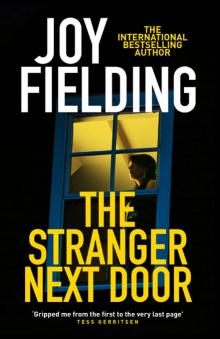 The Stranger Next Door
The Stranger Next Door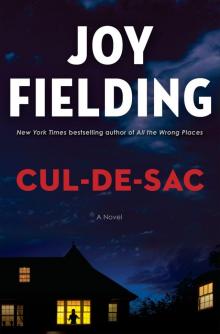 Cul-de-sac
Cul-de-sac The Final Act
The Final Act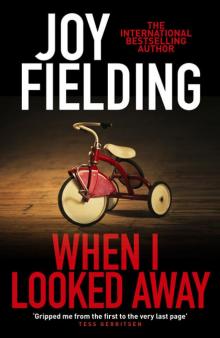 When I Looked Away
When I Looked Away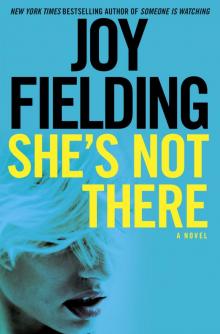 She's Not There
She's Not There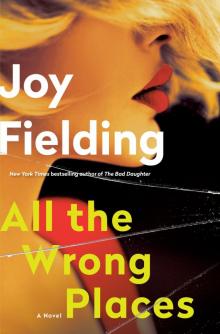 All the Wrong Places
All the Wrong Places Now You See Her
Now You See Her Don't Cry Now
Don't Cry Now Good Intentions
Good Intentions Still Life
Still Life Lost
Lost The First Time
The First Time Whispers and Lies
Whispers and Lies The Other Woman
The Other Woman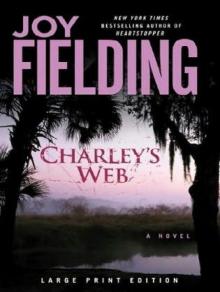 Charley's Web
Charley's Web Mad River Road
Mad River Road Puppet
Puppet Life Penalty
Life Penalty The Wild Zone
The Wild Zone Home Invasion
Home Invasion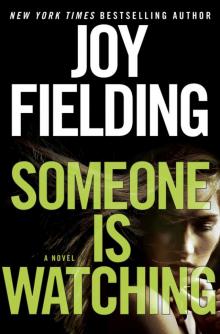 Someone Is Watching
Someone Is Watching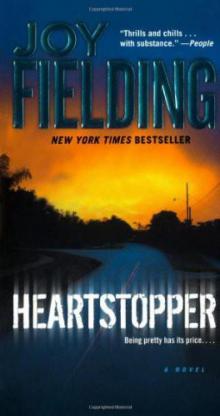 Heartstopper
Heartstopper See Jane Run
See Jane Run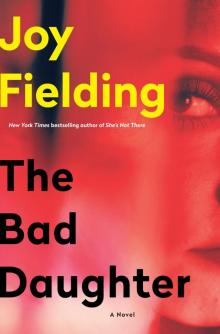 The Bad Daughter
The Bad Daughter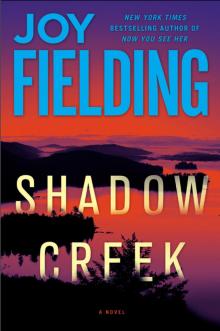 Shadow Creek
Shadow Creek Missing Pieces
Missing Pieces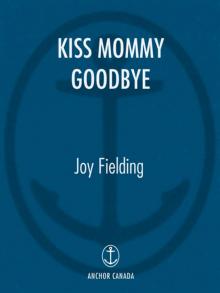 Kiss Mommy Goodbye
Kiss Mommy Goodbye Grand Avenue
Grand Avenue